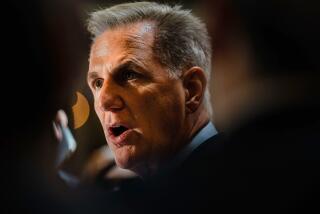U.S. threatens to end Iran nuclear talks
- Share via
Reporting from Washington — A senior Obama administration official warned Thursday that world powers could break off nuclear negotiations in Vienna this month unless Iran begins to make concessions.
The official said that though the six world powers and Iran have an option to continue the talks on Iran’s disputed nuclear program for six months beyond the current July 20 deadline, that won’t happen unless both sides believe it is worthwhile.
------------
FOR THE RECORD
An earlier version of this post said the official spoke Friday. He spoke on Thursday.
------------
“An extension is by no means automatic, as some have made it seem in the press,” the official told a group of reporters. “All parties have to agree to one.”
The official insisted on remaining unidentified under rules set by the administration.
The blunt warning was part of a public campaign by U.S. officials to pressure Iran to make concessions that would allow completion of a historic nuclear deal.
The United States and five other world powers -- France, Britain, Germany, Russia and China -- have been trying for five months to negotiate a deal that would ease international sanctions on Iran’s economy if it accepts curbs aimed at preventing it from obtaining the capability to make bombs.
The two sides have been deadlocked on key issues since mid-May.
This week, with negotiators gathered in Vienna for the sixth round of talks since February, each side has accused the other of pressing unreasonable demands.
Iranian officials have said that if the deadlock continues, the two sides could simply extend the talks until Jan. 20. But U.S. officials, facing complaints from U.S. lawmakers that Iran is trying to run out the clock, appear more eager to wrap up the deal as soon as possible.
On Wednesday, Iranian Foreign Minister Mohammad Javad Zarif complained in a YouTube video that the United States’ “maximalist” demands were threatening to derail the talks.
The U.S. official insisted that, on multiple occasions, the major powers had given Iran a variety of proposals.
“The facts are that we are putting down very reasonable positions,” the official said.
The official rejected Iran’s portrayal of the talks as a negotiation in which the West is denying Iran the fair treatment and respect it deserves. Rather, in the American view the talks are about forcing a country that has broken international rules on nuclear proliferation to comply with them, the official said.
The negotiations are not “about two parties meeting each other halfway,” the official said. “This is not a mediation. This is about the international community’s need for Iran to meet its international nonproliferation obligations after years of violations.”
The official said that Iran did not make significant concessions in the first two days of the talks this week. “Significant gaps remain,” the official said.
There is now a chance that Secretary of State John F. Kerry will join the talks in coming days even if the impasse is not broken, diplomats said. If he arrives, top diplomats from many of the other five states may go to Vienna as well, giving the talks a higher profile, and probably more complexity as well.
Yet the senior administration official acknowledged that, following the pattern of negotiations, the Iranians may not be willing to reveal what they are willing to concede until the final hours of talks.
“We know that some of the choices Iran needs to make will probably be made as late as possible,” the official said.
For foreign policy news, follow @richtpau on Twitter
More to Read
Sign up for Essential California
The most important California stories and recommendations in your inbox every morning.
You may occasionally receive promotional content from the Los Angeles Times.











